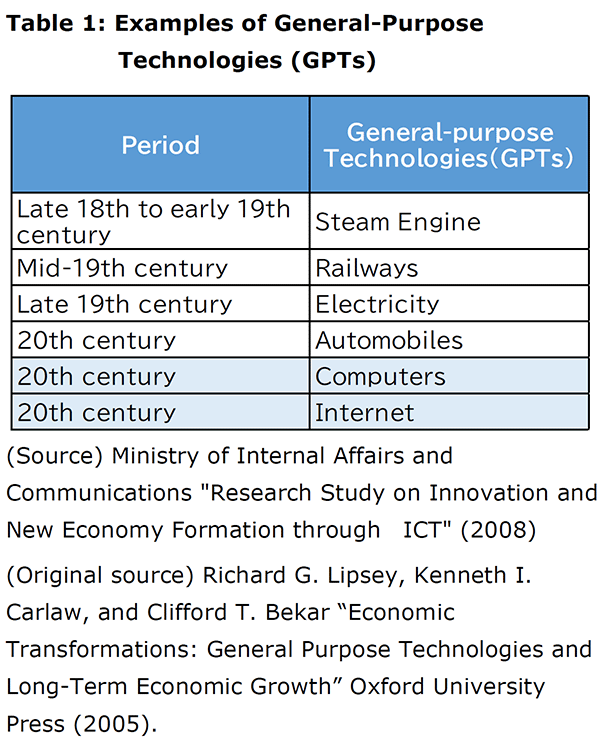

- Report Index
- Impact of Generative AI on the Labor Market
The Versatility of Generative AI
With the advent of generative AI, such as Chat GPT, AI is rapidly automating and streamlining our work beyond our expectations. A key difference between traditional AI and generative AI is its extraordinary “versatility”. Traditional AI has mostly worked in specific domains, such as self-driving cars, military operations, the game “Go”, language translation, and more. Consequently, its impact on labor markets has been somewhat limited. Generative AI, on the other hand, is expected to have a new impact on a wide range of labor markets due to its innate ability to effortlessly produce various types of content such as text, images, videos, code, and beyond. This has the potential to streamline and replace many tasks typically performed by white-collar workers.
Impact of Generative AI: “GPTs are GPTs”
In March 2023, Open AI and the University of Pennsylvania published a joint paper, "GPTs are GPTs: An Early Look at the Labour Market Impact Potential of Large Language Models". This paper explored how the efficiencies brought about by Large Language Models (LLMs) could affect at least 10% of work tasks for 80% of the US workforce, with at least 50% of tasks being affected for around 20% of workers.
Furthermore, the title "GPTs are GPTs" implies the grand conclusion that the natural language technology processing models such as Chat GPT (referred to as GPTs: Generative Pre-trained Transformers) will evolve into General-Purpose Technologies (GPTs) with a significant impact on society.
This means that we are on the verge of a day when we will be able to incorporate generative AI into our daily lives, similar to common technologies such as computers and the Internet, which are considered general- purpose technologies (Table 1).

New Impacts on Labor Market
While it has long been predicted that AI will replace human labor, the emergence of generative AI is expected to have a more profound impact on the labor market than expected. This is because generative AI will expand the pool of workers that can be replaced and accelerate the pace of their replacement.
In light of these new AI-driven labor market dynamics, a national debate is emerging on the future demand for labor and the nature of work in collaboration with AI.
In May 2023, the Japanese government established the “AI Strategy Council” to examine the country's approach to AI-related issues and risks. Additionally, the Employment Policy Study Group of the Ministry of Health, Labor and Welfare has initiated discussions, including the impact of generative AI on labor demand. Industry, government and academia need to engage in in-depth discussions on the prospects and challenges of the future labor market to ensure that Japanese society can fully reap the benefits of generative AI.
“AI reskilling” will be important across society
Under these circumstances, a comprehensive “AI reskilling” effort across society is now crucial. Just as workers adapted to new technologies in the past when computers and the internet first appeared, it is essential that society as a whole promotes reskilling, including learning generative AI.
To achieve this, it is imperative that a wide range of workers, from blue-collar workers to managers, acquire AI-related skills. This approach differs from the past, where only a select few specialists acquired specialized AI skills. By promoting “AI reskilling” across society, there is a unique opportunity to address labor shortages in a society with a declining population, and to create a virtuous cycle of increased productivity and higher wages in Japan.
Original in Japanese:
https://www.dlri.co.jp/report/dlri/273473.html
Disclaimer:
This report has been prepared for general information purposes only and is not intended to solicit investment. It is based on information that, at the time of preparation, was deemed credible by Dai-ichi Life Research Institute, but it accepts no responsibility for its accuracy or completeness. Forecasts are subject to change without notice. In addition, the information provided may not always be consistent with the investment policies, etc. of Dai-ichi Life or its affiliates.
